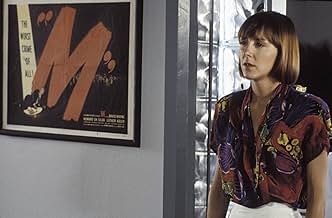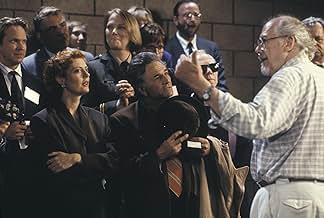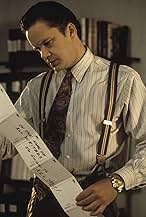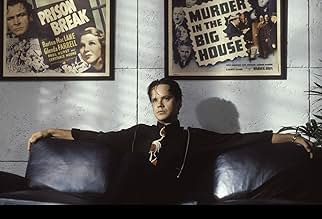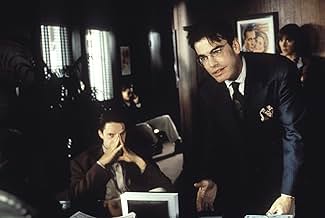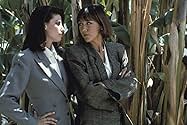El director de un estudio de Hollywood recibe amenazas de muerte de un escritor cuyo guión ha rechazado... ¿Pero cuál de ellos?El director de un estudio de Hollywood recibe amenazas de muerte de un escritor cuyo guión ha rechazado... ¿Pero cuál de ellos?El director de un estudio de Hollywood recibe amenazas de muerte de un escritor cuyo guión ha rechazado... ¿Pero cuál de ellos?
- Nominado a 3 premios Óscar
- 24 premios ganados y 33 nominaciones en total
Opiniones destacadas
Robert Altman gets under my skin. His films are worthy of great respect, yet they are frequently as irritating as they are brilliant. The Player is, as much as Short Cuts, a quintessential Altman film. It is also one of the best roles Tim Robbins has ever enjoyed.
This film is about Hollywood's dark underbelly. The Player eviscerates its subject by twisting justice, political gamesmanship and artistic integrity into new configurations. For non-film-buffs or non-professionals some of the humor may seem too subtle to notice. To film buffs and insiders, the humor is totally over the top.
Robbins plays a young studio exec who is playing the game to win and seems, at least part of the time, to have a conscience. Everything is going along fine for him until he starts receiving threatening calls and letters from a writer whose screenplays he has rejected, and an arch-rival is promoted to a position just above his own. Paranoia and real danger seem in the periphery of every scene in his life, as the make-believe of his industry and the reality of his life begin to blend freely.
Robbins makes a character who could easily have been totally unlikeable somehow sympathetic. Despite his amazing performance, liking the character makes you feel as if you should go stand in a shower and exfoliate for an hour or so. He is supported by excellent supporting work all around. Especially good are the two major women's roles - played by Greta Scachi and Bonnie Sherrow, and veteran camp character Dean Stockwell.
The photography is liberally and amusingly lifted from several classic thrillers, mysteries and dramas, and comes off fresh and original - not at all like a DePalmaesque bit of visual plagiarism. And the pace is brisk.
The Player is probably my favorite Altman film, and it is easily my favorite Tim Robbins film. It's entertaining, intelligent and, well, it has a bad attitude. See it some night when you're angry and you need a good dark laugh.
This film is about Hollywood's dark underbelly. The Player eviscerates its subject by twisting justice, political gamesmanship and artistic integrity into new configurations. For non-film-buffs or non-professionals some of the humor may seem too subtle to notice. To film buffs and insiders, the humor is totally over the top.
Robbins plays a young studio exec who is playing the game to win and seems, at least part of the time, to have a conscience. Everything is going along fine for him until he starts receiving threatening calls and letters from a writer whose screenplays he has rejected, and an arch-rival is promoted to a position just above his own. Paranoia and real danger seem in the periphery of every scene in his life, as the make-believe of his industry and the reality of his life begin to blend freely.
Robbins makes a character who could easily have been totally unlikeable somehow sympathetic. Despite his amazing performance, liking the character makes you feel as if you should go stand in a shower and exfoliate for an hour or so. He is supported by excellent supporting work all around. Especially good are the two major women's roles - played by Greta Scachi and Bonnie Sherrow, and veteran camp character Dean Stockwell.
The photography is liberally and amusingly lifted from several classic thrillers, mysteries and dramas, and comes off fresh and original - not at all like a DePalmaesque bit of visual plagiarism. And the pace is brisk.
The Player is probably my favorite Altman film, and it is easily my favorite Tim Robbins film. It's entertaining, intelligent and, well, it has a bad attitude. See it some night when you're angry and you need a good dark laugh.
'The Player (1992)' is a meta and witty inside-joke, jabbing at the ribs of tinsel-town in a cynical yet comedic way, and it manages to sardonically satirise the entire studio system, with a only little bit of self-aggrandising and perhaps an equal measure of self-deprecating. The picture isn't particularly funny, though it can cause some chuckles, but is instead the kind of sly smile inducing mockery that takes its time to dawn on you and isn't immediately obvious. It's this undercurrent that carries the flick much more than the main plot itself, so much so that the actual narrative becomes a part of the running gag as opposed to a vehicle for the individual jokes to spawn from. It's a unique, and somewhat acquired taste of a, film that's usually enjoyable and equally intelligent. 7/10
"Players only love you when they're playing." --Stevie Nicks
Griffin Mill, whose name has a kind of ersatz Hollywood feel to it (cf., D. W. Griffith/Cecil B. De Mille), is not a player with hearts so much as a player with dreams. He is a young and powerful film exec who hears thousands of movie pitches a year, but can only buy twelve. So he must do a lot of dissembling, not to mention outright lying, along with saying "We'll get back to you," etc. This is what he especially must say to writers. And sometimes they hold a grudge. In this case one of the rejected writers begins to stalk Griffin Mill and send him threatening postcards. And so the plot begins.
Tim Robbins, in a creative tour de force, plays Griffin Mill with such a delightful, ironic charm that we cannot help but identify with him even as he violates several layers of human trust. The script by Michael Tolkin smoothly combines the best elements of a thriller with a kind of Terry Southern satirical intent that keeps us totally engrossed throughout. The direction by Robert Altman is full of inside Hollywood jokes and remembrances, including cameos by dozens of Hollywood stars, some of whom get to say nasty things about producers. The scenes are well-planned and then infused with witty asides. The tampon scene at police headquarters with Whoopi Goldberg is an hilarious case in point, while the sequence of scenes from Greta Scacchi's character's house to the manslaughter scene outside the Pasadena Rialto, is wonderfully conceived and nicely cut. Also memorable is the all black and white dress dinner scene in which Cher is the only person in red, a kind of mean or silly joke, depending on your perspective. During the same scene Mill gives a little speech in which he avers that "movies are art," a statement that amounts to sardonic irony since, as a greedy producer, he cares nothing at all about art, but only about box office success. His words also form a kind of dramatic irony when one realizes that this movie itself really is a work of art. As Altman observes in a trailing clip, the movie "becomes itself." The Machiavellian ending illustrates this with an almost miraculous dovetailing. This is the kind of script that turns most screen writers Kermit-green with envy.
Incidentally, Joe Gillis, the Hollywood writer played by William Holden in Sunset Boulevard--personifying all unsuccessful screen writers--actually does call during the movie, but Mill doesn't recognize the name and has to be told he is being put on, further revealing the narrow confines of his character.
In short, this is a wonderfully clever, diabolically cynical satire of Hollywood and the movie industry. This is one of those movies that, if you care anything at all about film, you must see. Period. It is especially delicious if you hate Hollywood. It is also one of the best movies ever made about Hollywood, to be ranked up there with A Star is Born (1937) (Janet Gaynor, Fredric March); Sunset Boulevard (1950); A Star is Born (1954) (Judy Garland, James Mason); and Postcards from the Edge (1990).
I must add that in the annals of film, this has to go down as one of the best Hollywood movies not to win a single Academy Award, although it was nominated for three: Best Director, Best Adapted Screenplay and Best Editing. I suspect the Academy felt that the satire hit a little too close to home for comfort.
(Note: Over 500 of my movie reviews are now available in my book "Cut to the Chaise Lounge or I Can't Believe I Swallowed the Remote!" Get it at Amazon!)
Griffin Mill, whose name has a kind of ersatz Hollywood feel to it (cf., D. W. Griffith/Cecil B. De Mille), is not a player with hearts so much as a player with dreams. He is a young and powerful film exec who hears thousands of movie pitches a year, but can only buy twelve. So he must do a lot of dissembling, not to mention outright lying, along with saying "We'll get back to you," etc. This is what he especially must say to writers. And sometimes they hold a grudge. In this case one of the rejected writers begins to stalk Griffin Mill and send him threatening postcards. And so the plot begins.
Tim Robbins, in a creative tour de force, plays Griffin Mill with such a delightful, ironic charm that we cannot help but identify with him even as he violates several layers of human trust. The script by Michael Tolkin smoothly combines the best elements of a thriller with a kind of Terry Southern satirical intent that keeps us totally engrossed throughout. The direction by Robert Altman is full of inside Hollywood jokes and remembrances, including cameos by dozens of Hollywood stars, some of whom get to say nasty things about producers. The scenes are well-planned and then infused with witty asides. The tampon scene at police headquarters with Whoopi Goldberg is an hilarious case in point, while the sequence of scenes from Greta Scacchi's character's house to the manslaughter scene outside the Pasadena Rialto, is wonderfully conceived and nicely cut. Also memorable is the all black and white dress dinner scene in which Cher is the only person in red, a kind of mean or silly joke, depending on your perspective. During the same scene Mill gives a little speech in which he avers that "movies are art," a statement that amounts to sardonic irony since, as a greedy producer, he cares nothing at all about art, but only about box office success. His words also form a kind of dramatic irony when one realizes that this movie itself really is a work of art. As Altman observes in a trailing clip, the movie "becomes itself." The Machiavellian ending illustrates this with an almost miraculous dovetailing. This is the kind of script that turns most screen writers Kermit-green with envy.
Incidentally, Joe Gillis, the Hollywood writer played by William Holden in Sunset Boulevard--personifying all unsuccessful screen writers--actually does call during the movie, but Mill doesn't recognize the name and has to be told he is being put on, further revealing the narrow confines of his character.
In short, this is a wonderfully clever, diabolically cynical satire of Hollywood and the movie industry. This is one of those movies that, if you care anything at all about film, you must see. Period. It is especially delicious if you hate Hollywood. It is also one of the best movies ever made about Hollywood, to be ranked up there with A Star is Born (1937) (Janet Gaynor, Fredric March); Sunset Boulevard (1950); A Star is Born (1954) (Judy Garland, James Mason); and Postcards from the Edge (1990).
I must add that in the annals of film, this has to go down as one of the best Hollywood movies not to win a single Academy Award, although it was nominated for three: Best Director, Best Adapted Screenplay and Best Editing. I suspect the Academy felt that the satire hit a little too close to home for comfort.
(Note: Over 500 of my movie reviews are now available in my book "Cut to the Chaise Lounge or I Can't Believe I Swallowed the Remote!" Get it at Amazon!)
"The Player" is bigger than the sum total of it's ingredients, because this Robert Altman classic has got so many links pointing to movie history that it is dizzying. It is all about Hollywood and the ins and outs of the movie industry. But let me first focus on the story for now, for those who just wanna see a suspenseful who dunnit story.
"The Player" is a slowburning, yet suspenseful detective story, with funny breathers scattered throughout. Whoopi Goldberg swinging her tampon is one of those hilarious scenes that lights up the seriousness of this detective story about the death threats. It's a who dunnit, with some jokes and with lots of parodies on the inside world of Hollywood. Lots and I really mean lots and lots of actors play themselves in this movie. Everybody wanted to be part of this movie that could be described as "a chainsaw cutting down Hollywood's image"
What's the story about? Tim Robbins plays a hollywood producer elbowing his way to the top. This selfish movie producer will do anything to gain more succes in the superficial world of Hollywood and he is hated by many writers and actors, who were ridiculed or rejected by him. This obnoxious movie producer starts getting death threats mailed to him by postcards. The death threats get more serious every week and Tim Robbins gets desperate to find out which psychotic writer is sending these threats.
"The Player" at first depicts the search for this mysterious person who is sending these evil death threats, but later on the movie takes a dramatic turn which I wont reveal here to avoid spoilers. As I said before, it is a slowburning story, yet slowly climaxing into a very suspenseful ending. Over 2 hours long. But I enjoyed every minute of it and I must have seen it over 10 times by now.
Acting is not particularly great, yet rather funny, in a more amusing satirical way. It is especially funny to see all those well known actors (in the nineties) walk by in this movie playing themselves. That is just eye candy. Julia Roberts, Bruce Willis among others in cameo roles, hilarous stuff!
This direction by Robert Altman is to be highly complimented for many things. Movie geeks would have a field day analyzing this satire on Hollywood. Read all the other reviews, people just have a field day here on imdb analyzing this Hollywood satire. Director Robert Altman made a very suspenseful yet funny detective story that has stood the test of time. More than 20 years later this movie is still a thrill and joy to watch...
"The Player" is a slowburning, yet suspenseful detective story, with funny breathers scattered throughout. Whoopi Goldberg swinging her tampon is one of those hilarious scenes that lights up the seriousness of this detective story about the death threats. It's a who dunnit, with some jokes and with lots of parodies on the inside world of Hollywood. Lots and I really mean lots and lots of actors play themselves in this movie. Everybody wanted to be part of this movie that could be described as "a chainsaw cutting down Hollywood's image"
What's the story about? Tim Robbins plays a hollywood producer elbowing his way to the top. This selfish movie producer will do anything to gain more succes in the superficial world of Hollywood and he is hated by many writers and actors, who were ridiculed or rejected by him. This obnoxious movie producer starts getting death threats mailed to him by postcards. The death threats get more serious every week and Tim Robbins gets desperate to find out which psychotic writer is sending these threats.
"The Player" at first depicts the search for this mysterious person who is sending these evil death threats, but later on the movie takes a dramatic turn which I wont reveal here to avoid spoilers. As I said before, it is a slowburning story, yet slowly climaxing into a very suspenseful ending. Over 2 hours long. But I enjoyed every minute of it and I must have seen it over 10 times by now.
Acting is not particularly great, yet rather funny, in a more amusing satirical way. It is especially funny to see all those well known actors (in the nineties) walk by in this movie playing themselves. That is just eye candy. Julia Roberts, Bruce Willis among others in cameo roles, hilarous stuff!
This direction by Robert Altman is to be highly complimented for many things. Movie geeks would have a field day analyzing this satire on Hollywood. Read all the other reviews, people just have a field day here on imdb analyzing this Hollywood satire. Director Robert Altman made a very suspenseful yet funny detective story that has stood the test of time. More than 20 years later this movie is still a thrill and joy to watch...
I am surprised that the IMDb trivia section is so short for this film. After all, it's jammed full of references to earlier films and is full of actor cameos. Because of this, it's clearly a film that bears re- watching in order to catch the many small details many would often miss. Also, because this film is ultra-famous, already has many reviews and is beloved by many, I'll keep my review relatively short. Suffice to say that it's a film lovers and insiders dream movie.
The film begins with an insanely difficult scene that sets the stage for the film. It's all in one long take where the camera moves all over a wide area on a film studio lot. But instead of being intimate, it feels almost like the viewer is hiding and peering at the many different things occurring simultaneously. This is brilliant, as the film does have a real voyeuristic quality...with many shots that are not traditionally framed but are as if you are watching in the near distance.
What follows is a very dark anti-fairy tale set in modern Hollywood. Instead of the usual story of a person working hard and doing good and ultimately being rewarded, this is pretty much the opposite. With a total jerk-face (Tim Robbins) screwing people over and even killing someone...and the consequences of this. It's obviously meant as an attack on many Hollywood types--the users, the superficial and the vaguely talented. Overall, a superb film that works very well due to wonderful direction and a black hole-dark script filled with cynicism.
The film begins with an insanely difficult scene that sets the stage for the film. It's all in one long take where the camera moves all over a wide area on a film studio lot. But instead of being intimate, it feels almost like the viewer is hiding and peering at the many different things occurring simultaneously. This is brilliant, as the film does have a real voyeuristic quality...with many shots that are not traditionally framed but are as if you are watching in the near distance.
What follows is a very dark anti-fairy tale set in modern Hollywood. Instead of the usual story of a person working hard and doing good and ultimately being rewarded, this is pretty much the opposite. With a total jerk-face (Tim Robbins) screwing people over and even killing someone...and the consequences of this. It's obviously meant as an attack on many Hollywood types--the users, the superficial and the vaguely talented. Overall, a superb film that works very well due to wonderful direction and a black hole-dark script filled with cynicism.
¿Sabías que…?
- TriviaThe celebrity cameos were not written in the script. Robert Altman added them all in. No scripted dialogue was given to any celebrity with a cameo.
- ErroresWhen Mill reads the newspaper story about the murder, a closeup of article reveals that it is just the same few paragraphs printed over and over.
- Citas
Griffin Mill: It lacked certain elements that we need to market a film successfully.
June: What elements?
Griffin Mill: Suspense, laughter, violence. Hope, heart, nudity, sex. Happy endings. Mainly happy endings.
June: What about reality?
- Créditos curiososTim Robbins, Fred Ward and Cynthia Stevenson all enter the film when their names appear in the opening credits.
- Versiones alternativasIn the theatrical version there was a frontal nude scene of Tim Robbins at the hotel in the desert. This scene was removed for the cable version.
Selecciones populares
Inicia sesión para calificar y agrega a la lista de videos para obtener recomendaciones personalizadas
- How long is The Player?Con tecnología de Alexa
Detalles
- Fecha de lanzamiento
- País de origen
- Idioma
- También se conoce como
- The Player
- Locaciones de filmación
- 1921 Westholme Ave, Los Ángeles, California, Estados Unidos(June Gudmundsdottir's house)
- Productoras
- Ver más créditos de la compañía en IMDbPro
Taquilla
- Presupuesto
- USD 8,000,000 (estimado)
- Total en EE. UU. y Canadá
- USD 21,706,101
- Fin de semana de estreno en EE. UU. y Canadá
- USD 302,216
- 12 abr 1992
- Total a nivel mundial
- USD 21,706,547
- Tiempo de ejecución2 horas 4 minutos
- Color
- Mezcla de sonido
- Relación de aspecto
- 1.85 : 1
Contribuir a esta página
Sugiere una edición o agrega el contenido que falta

Principales brechas de datos
By what name was El ejecutivo (1992) officially released in India in English?
Responda


